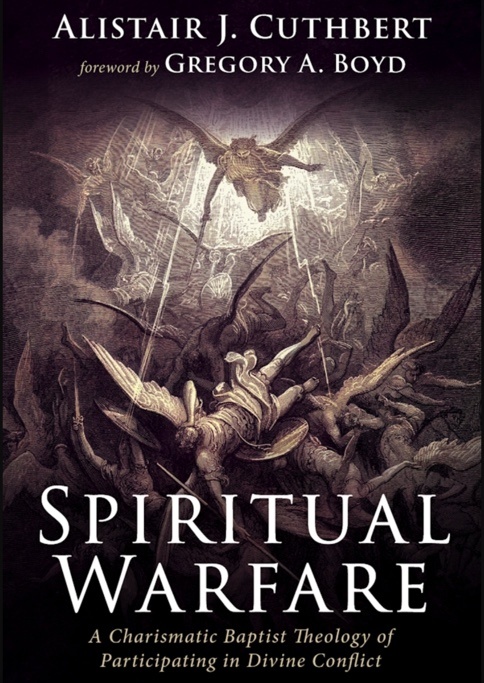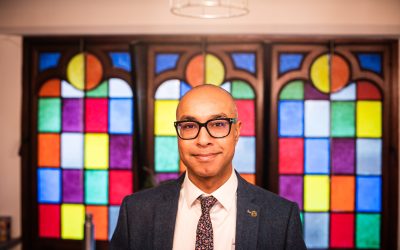This month Lyndsay caught up with Alistair Cuthbert to find out more about his brand new book, Spiritual Warfare! Alistair (Al) joined the College in September 2025 having previously been the minister of Falkirk Baptist Church in central Scotland since July 2017. Before his time at Falkirk, Al was part of the pastoral staff teams at Stirling BC and then St Andrews BC, after years of missionary work with YWAM.
L: Hey Al, thanks for taking some time to share more with us now you’ve published your new book ‘Spiritual Warfare’. The title suggests a fascinating read, how would you describe what it is about?
Al: Yes, basically, it is a theological account of the Doctrine of God (God’s nature and character) that we can imbibe to help us understand God’s sovereignty and his work in a world that is marred by perpetual conflict, evil, abuse, war, etc.
The book is the publication of my PhD thesis which I gained from the University of St Andrews in 2023.
L: What prompted you to write on this subject- was there a moment or experience that made you realise this was the book you needed to write?
Al: Before becoming a Baptist minister, I was a missionary in YWAM and I travelled extensively all over the world doing missions and ministry. In those years, I experienced and heard stories about explicit manifestations of the occult and other evil phenomena.
At the time, my theological understanding of God could not make sense of what I was witnessing in my travels and so I decided that if I got the chance, I’d like to explore the world of spiritual warfare from a systematic theological angle.
L: The title talks about “participating in divine conflict”- what do you mean by that, and why do you believe it is important for Christians today?
Al: Part of the doctrine of God that is formulated in my book has much room for the free agency of human beings to be involved in the spiritual battle by using the spiritual weapons we have at our disposal (i.e. prayer, worship, compassion, deliverance, etc.).
Too often, especially in our Scottish context, we can believe that it’s all down to God’s will & omni-control and that we have no part to play in it. The book argues the opposite in that God calls us to partner with him and to do our part in seeing pain, suffering and evil in our communities transformed by the power of God.
L: How did drawing on Paul S. Fiddes’ theology shape the direction of your thinking and writing?
Al: Paul Fiddes is the most prodigious living Baptist theologian in the English-speaking world today and has produced a significant amount of theological work over his 50+ year career teaching theology at the University of Oxford.
Part of the dissertation was to write a theological analysis of Fiddes’ entire catalogue of work and so I read & studied all 200+ papers, books, edited volumes, etc. that he has produced.
Therefore, it is fair to say that I’ve been significantly influenced by him, especially in the area of the Doctrine of God.
That said however, I do critique him strongly at certain points and so am not in total agreement with some elements of his Doctrine of God account, especially where it pertains to spiritual warfare.
L: The book deals with the reality of evil in the world and God’s presence in the midst of it. How do you hope readers will be changed, encouraged, or challenged after reading?
Al: In the book I occasionally consider theodicy questions (why is there so much suffering on earth?) but don’t attempt to give all-encompassing answers to these questions.
Instead, a main aim of the book is to move believers from pontificating and theorising about why there is suffering in the world to a posture of action which attempts to mitigate suffering and evil, while accepting that we’ll never know the complete answers to the ‘why’ questions.
L: Who did you have in mind as your main audience when you were writing, and how might it also connect with Scottish Baptists who may or may not naturally think of themselves as “charismatic”?
Al: This book is written for any thinking Christian believer who reflects on their faith and the impact of that faith in the world. At times the book is quite technical and so it will stretch people in their ability to think theologically.
With respect to the charismatic element, it has been suggested that to write about the subject of spiritual warfare these days is somewhat anachronistic. However, what most churches in Scotland are now experiencing is, due to an increase in immigration, the nations coming to our churches.
Invariably, therefore, there will be an increase in believers from other parts of the world whose worldview is very open to explicit occurrences of animism, occult and other practices. Therefore, I do think this subject is salient for today’s increasingly multi-cultural reality in our churches.
L: Why do you think now is an important moment for Christians to be engaging seriously with the topic of spiritual warfare?
Apologists (those who defend the Christian faith) state that the number 1 reason that stops people becoming believers is the amount of suffering and pain in the world.
As classically stated, ‘how can we believe in an all-mighty, benevolent deity in a world with so much pain and suffering?’ Spiritual warfare is a significant part of the overall theodicy project, and the Bible clearly states that there are nefarious spiritual beings at work behind the scenes who love to exacerbate torment, death, suffering, evil and so on.
Even though we tend to downplay this reality here in the west, as perpetual war and suffering on a global scale continues (47% of countries in the world are involved in a conflict today) the church needs to rise up, acknowledge all that is happening, and join God in his battle against the spiritual forces of darkness. Until Jesus returns, God is at war, and he calls his people to participate alongside Him.
L: What was the most surprising or eye-opening thing you discovered during your research and writing process?
Al: For me, the biggest realisation was the fact that systematic theology can lead to action, and not just abstract theorising. The discipline of systematics gets a bad rap as being of no practical use at all whereas I found the opposite in doing this research.
Thinking about who God is, and how we as humans ‘live and move and have our being’ in Him drove me to think about practical application more than I expected.
I also really enjoyed engaging with other theologians from other traditions who often enhanced the claims of Fiddes and made the theological account richer and deeper.
L: If someone’s on the fence about picking up the book, what’s one thing you’d say to encourage them to read it?
Hopefully, everyone can acknowledge that the world is marred with so much conflict and pain at present and that something needs to be done about it. My book will help the reader seriously think through what part they can play in this spiritual conflict.
Moreover, it will also formulate an understanding of our commanding officer (i.e. God) that fills us with faith and confidence when we face each spiritual conflict scenario.
Even though the war has already been won through the death and resurrection of Jesus Christ, the full realisation of that victory has not happened yet and so we still need to co-labour with God in myriads of spiritual battles taking place in our communities and around the world.
L: Thanks Al, for sharing your vision and passion for this subject and taking us on a more ‘behind-the-scenes’ tour of your new book!
Spiritual Warfare is available to buy now at either:
Wipf and Stock Publishers (www.wipfandstock.com) or Amazon (www.amazon.co.uk)



